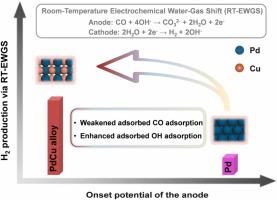Nano Energy ( IF 16.8 ) Pub Date : 2022-08-18 , DOI: 10.1016/j.nanoen.2022.107704 Huifang Wei , Huan Liu , Liang Yu , Mo Zhang , Yunlong Zhang , Jinchang Fan , Xiaoju Cui , Dehui Deng

|
Room-temperature electrochemical water-gas shift (RT-EWGS) process provides a promising route for high purity hydrogen production under ambient conditions, in which the anodic carbon monoxide (CO) oxidation as the key and bottleneck-type reaction largely hinders the overall efficiency due to its sluggish reaction kinetics. It is of great significance to develop low cost and efficient anode electrocatalysts to enhance the hydrogen production via improving the CO oxidation activity, but it remains a great challenge. Herein, by alloying Pd with Cu, we achieve a high mass activity of 19.9 mA/mgPd for anodic CO oxidation at 0.3 V versus reversible hydrogen electrode (vs. RHE), which is over 330 times higher than that over pure Pd catalyst and significantly higher than the previously reported catalysts. Combined with density functional theory calculations, we find that the adsorbed CO (CO*) species is more likely to react with the adsorbed OH (OH*) rather than the OH- in the solution for PdCu alloy catalyst during the anodic CO oxidation process, and the introduction of Cu into Pd renders a weakened CO* adsorption along with an enhanced OH* adsorption, which significantly lower the overpotential via optimizing the anodic oxidation of CO pathway. This work provides a new direction for the design of efficient anode catalysts toward RT-EWGS with low energy input.
中文翻译:

将 Pd 与 Cu 合金化可通过室温电化学水煤气变换反应促进制氢
室温电化学水煤气变换 (RT-EWGS) 工艺为在环境条件下生产高纯度氢气提供了一条有前景的途径,其中阳极一氧化碳 (CO) 氧化作为关键和瓶颈型反应在很大程度上阻碍了整体效率由于其缓慢的反应动力学。开发低成本、高效的阳极电催化剂,通过提高CO氧化活性来提高产氢量具有重要意义,但仍是一个巨大的挑战。在此,通过将 Pd 与 Cu 合金化,我们在 0.3 V 下实现了 19.9 mA/mg Pd与可逆氢电极相比的阳极 CO 氧化的高质量活性。RHE),比纯 Pd 催化剂高 330 倍以上,显着高于先前报道的催化剂。结合密度泛函理论计算,我们发现在阳极 CO 氧化过程中,吸附的 CO (CO*) 物种更可能与吸附的 OH (OH*) 而不是 OH -在 PdCu 合金催化剂溶液中发生反应,并且将 Cu 引入 Pd 会减弱 CO* 吸附以及增强 OH* 吸附,从而通过优化 CO 途径的阳极氧化显着降低过电位。这项工作为低能量输入的 RT-EWGS 高效阳极催化剂的设计提供了新的方向。











































 京公网安备 11010802027423号
京公网安备 11010802027423号